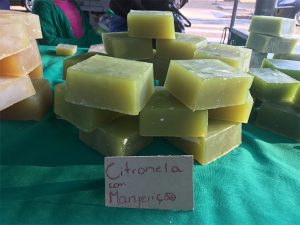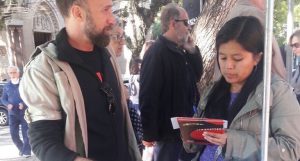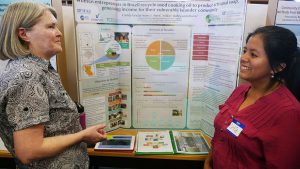A study of one Brazilian community finds women entrepreneurs there are recycling cooking oil and making a profit. The artisanal soap they produce from the used oil keeps the community clean by preventing soil and water contamination. Carlita Fiestas-Nunez, a student in the Master of Sustainable Development Practice program, researched the group of women and their business model. She presented her findings recently at the UF Center for Latin American Studies Fieldwork Festival.

“I want people to realize that we can all contribute to the conservation of natural resources by just collecting our oil, for example,” Fiestas-Nunez says. The Callao, Peru native, spent the summer of 2018 conducting research in Ilha das Flores, Porto Alegre.
The improper disposal of used cooking oil is a problem worldwide. It is poured down the sink most of the time, and in places lacking a sewage system, the oil is dumped on the ground, polluting soil and water.
The female group in Porto Alegre, which belongs to the Ilhéus Ecológicos (Ecological Islander) Association, encourages residents to recycle used cooking oil. The women have collection points at the stand where they sell artisanal soaps. The soaps are made from used cooking oil and medicinal herbs.

Fiestas-Nunez wants these women entrepreneurs recognized for helping their vulnerable community in Porto Alegre.
“Despite all the socio-economic barriers they deal with, they are highly committed to produce this eco-friendly product that provides them income,” she says. “It contributes to the idea that we can achieve economic development by investing in sustainable industries.”
In addition to the soap production, Fiestas-Nunez explored market opportunities to expand sales of the artisanal soap. That identified three more outlets for the product.
“This means the environmentally-friendly micro-business can expand, and more people will be encouraged to recycle their used cooking oil,” Fiestas-Nunez points out. “This, in turn, will contribute to the conservation of water and soil in urban areas such as the city of Porto Alegre, Brazil.”

She conducted the research under her thesis advisor, Dr. Ann Wilkie, research professor in the UF/IFAS Soil and Water Sciences Department. The two met when Fiestas-Nunez volunteered at the UF Student Compost Cooperative, organized by the BioEnergy and Sustainable Technology (BEST) Laboratory within the Department.
“Carlita did a great job examining social, environmental, and economic factors through this research,” Wilkie says. “She also learned to speak Portuguese thanks to the Foreign Language and Area of Studies (FLAS) Fellowship from the Center for Latin American Studies.”
“During my research, I improved my Portuguese a lot,” Fiestas-Nunez adds. “Now I can say I speak Portuguese, and I am still taking classes because they renewed my fellowship for this academic year.”
 0
0
